Bibliography: Generally Accepted Accounting Principles
VerifiedAdded on 2021/06/14
|13
|3313
|281
AI Summary
The authors that are seen as the leading scholars in the field of accounting and finance have agreed to the fact that the accounting profession has increased the speed of information and controls in the business world, but now has to become a ‘hybrid accountant’ within the organization. External factors includes the forces outside the organization like the environmental factors like the globalization, market competition and information technology advancements that leads to the changes in organization’s activities. It also represents the techniques of the operations and management that would enable
Contribute Materials
Your contribution can guide someone’s learning journey. Share your
documents today.
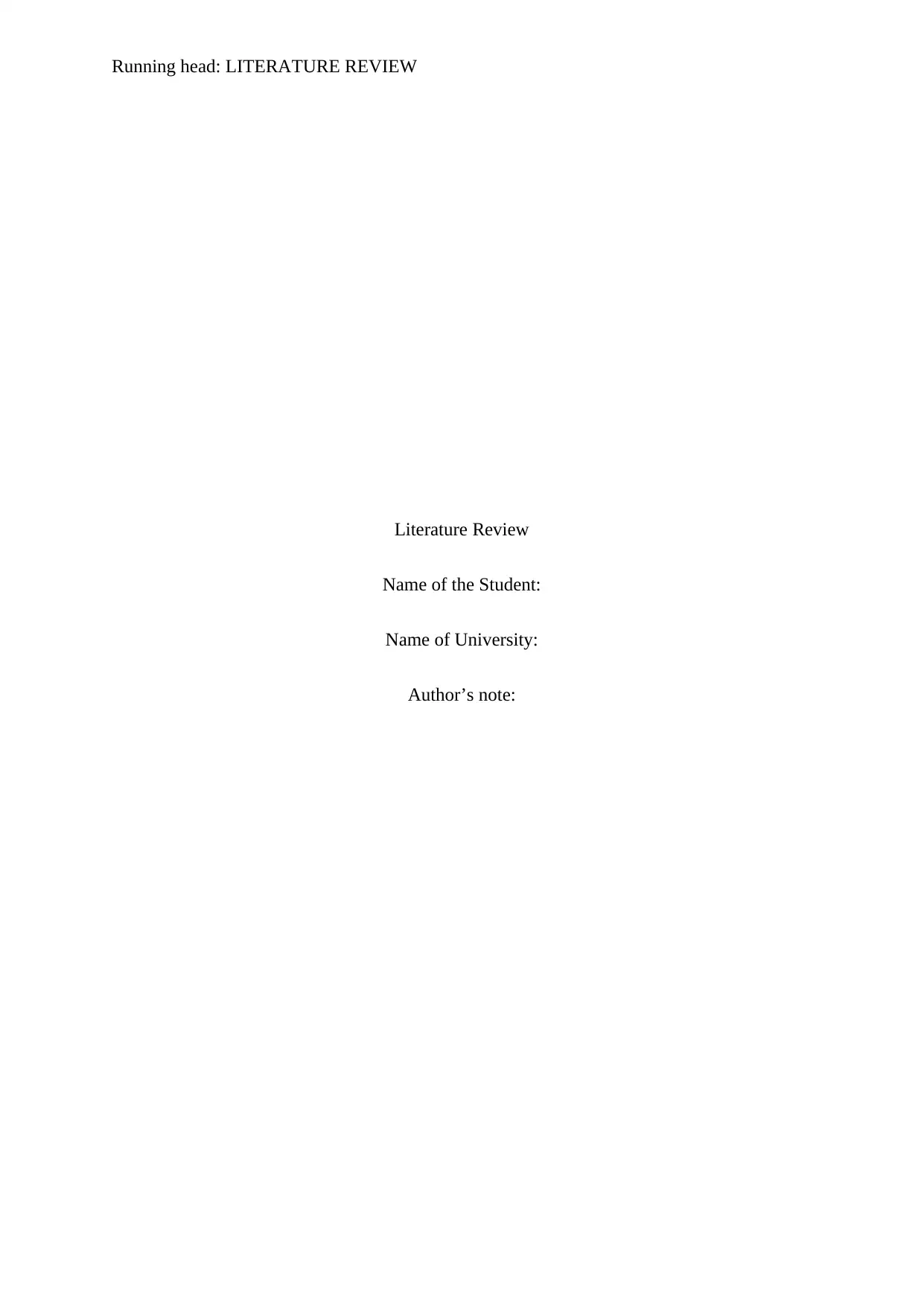
Running head: LITERATURE REVIEW
Literature Review
Name of the Student:
Name of University:
Author’s note:
Literature Review
Name of the Student:
Name of University:
Author’s note:
Secure Best Marks with AI Grader
Need help grading? Try our AI Grader for instant feedback on your assignments.
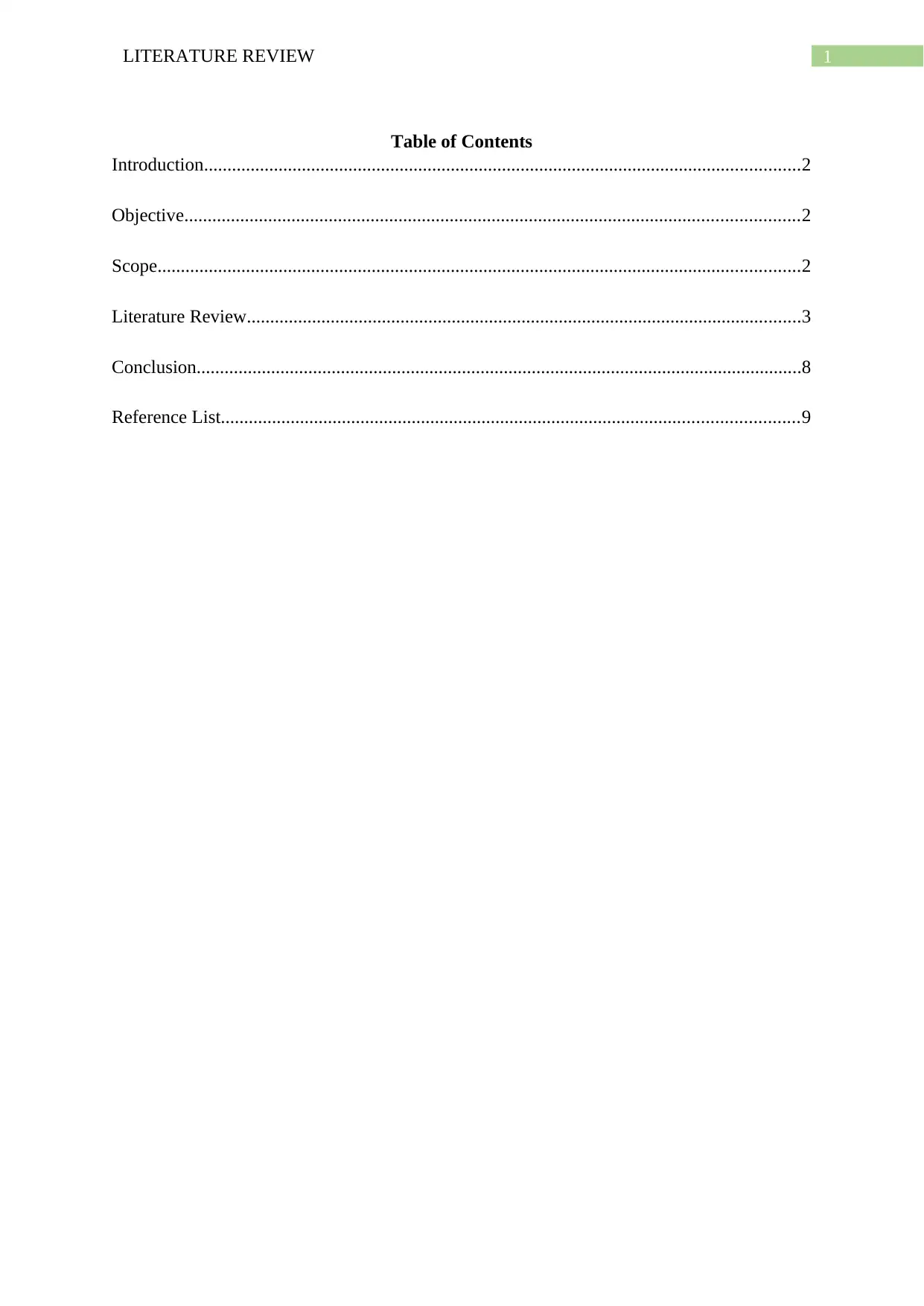
1LITERATURE REVIEW
Table of Contents
Introduction................................................................................................................................2
Objective....................................................................................................................................2
Scope..........................................................................................................................................2
Literature Review.......................................................................................................................3
Conclusion..................................................................................................................................8
Reference List............................................................................................................................9
Table of Contents
Introduction................................................................................................................................2
Objective....................................................................................................................................2
Scope..........................................................................................................................................2
Literature Review.......................................................................................................................3
Conclusion..................................................................................................................................8
Reference List............................................................................................................................9
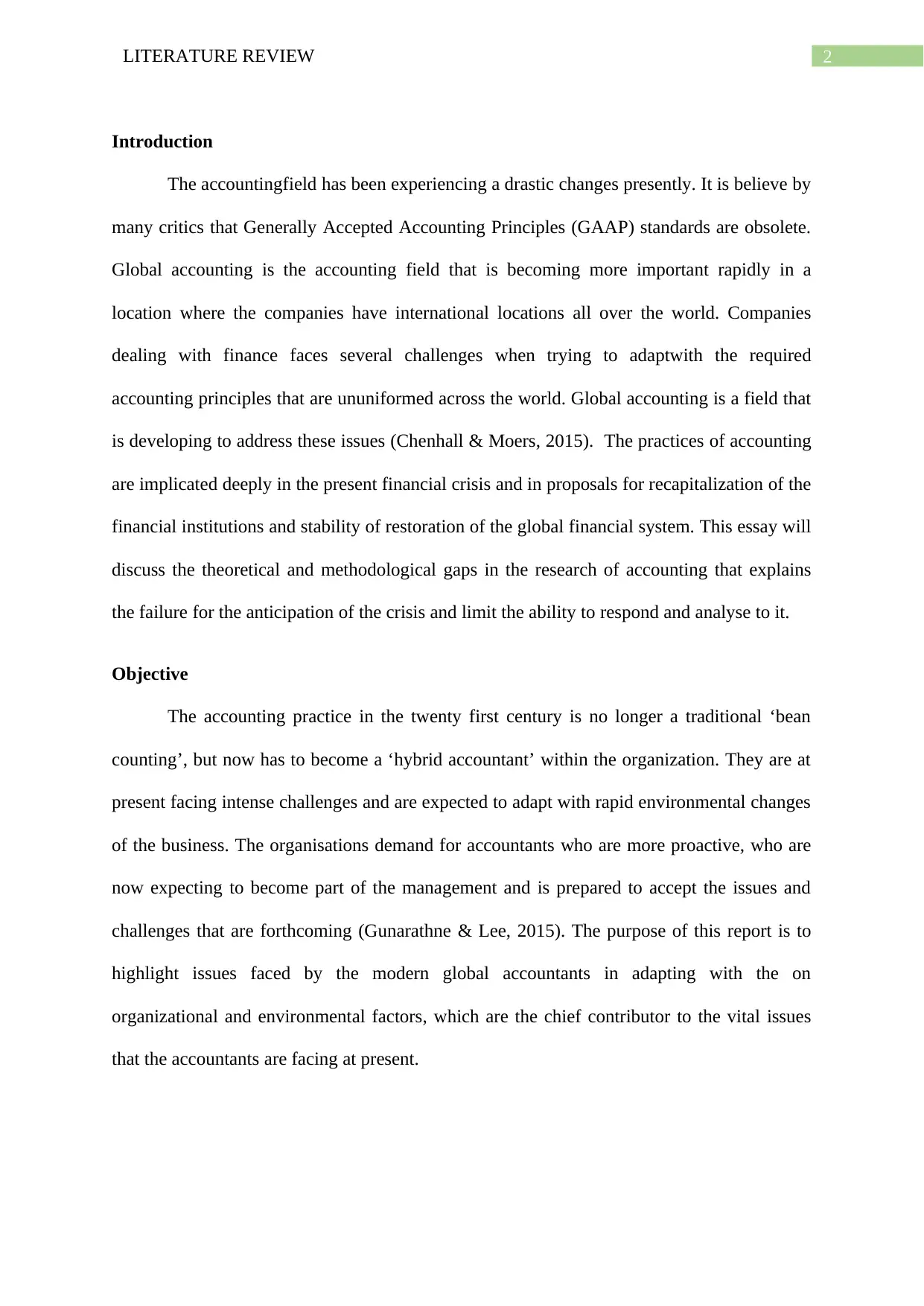
2LITERATURE REVIEW
Introduction
The accountingfield has been experiencing a drastic changes presently. It is believe by
many critics that Generally Accepted Accounting Principles (GAAP) standards are obsolete.
Global accounting is the accounting field that is becoming more important rapidly in a
location where the companies have international locations all over the world. Companies
dealing with finance faces several challenges when trying to adaptwith the required
accounting principles that are ununiformed across the world. Global accounting is a field that
is developing to address these issues (Chenhall & Moers, 2015). The practices of accounting
are implicated deeply in the present financial crisis and in proposals for recapitalization of the
financial institutions and stability of restoration of the global financial system. This essay will
discuss the theoretical and methodological gaps in the research of accounting that explains
the failure for the anticipation of the crisis and limit the ability to respond and analyse to it.
Objective
The accounting practice in the twenty first century is no longer a traditional ‘bean
counting’, but now has to become a ‘hybrid accountant’ within the organization. They are at
present facing intense challenges and are expected to adapt with rapid environmental changes
of the business. The organisations demand for accountants who are more proactive, who are
now expecting to become part of the management and is prepared to accept the issues and
challenges that are forthcoming (Gunarathne & Lee, 2015). The purpose of this report is to
highlight issues faced by the modern global accountants in adapting with the on
organizational and environmental factors, which are the chief contributor to the vital issues
that the accountants are facing at present.
Introduction
The accountingfield has been experiencing a drastic changes presently. It is believe by
many critics that Generally Accepted Accounting Principles (GAAP) standards are obsolete.
Global accounting is the accounting field that is becoming more important rapidly in a
location where the companies have international locations all over the world. Companies
dealing with finance faces several challenges when trying to adaptwith the required
accounting principles that are ununiformed across the world. Global accounting is a field that
is developing to address these issues (Chenhall & Moers, 2015). The practices of accounting
are implicated deeply in the present financial crisis and in proposals for recapitalization of the
financial institutions and stability of restoration of the global financial system. This essay will
discuss the theoretical and methodological gaps in the research of accounting that explains
the failure for the anticipation of the crisis and limit the ability to respond and analyse to it.
Objective
The accounting practice in the twenty first century is no longer a traditional ‘bean
counting’, but now has to become a ‘hybrid accountant’ within the organization. They are at
present facing intense challenges and are expected to adapt with rapid environmental changes
of the business. The organisations demand for accountants who are more proactive, who are
now expecting to become part of the management and is prepared to accept the issues and
challenges that are forthcoming (Gunarathne & Lee, 2015). The purpose of this report is to
highlight issues faced by the modern global accountants in adapting with the on
organizational and environmental factors, which are the chief contributor to the vital issues
that the accountants are facing at present.
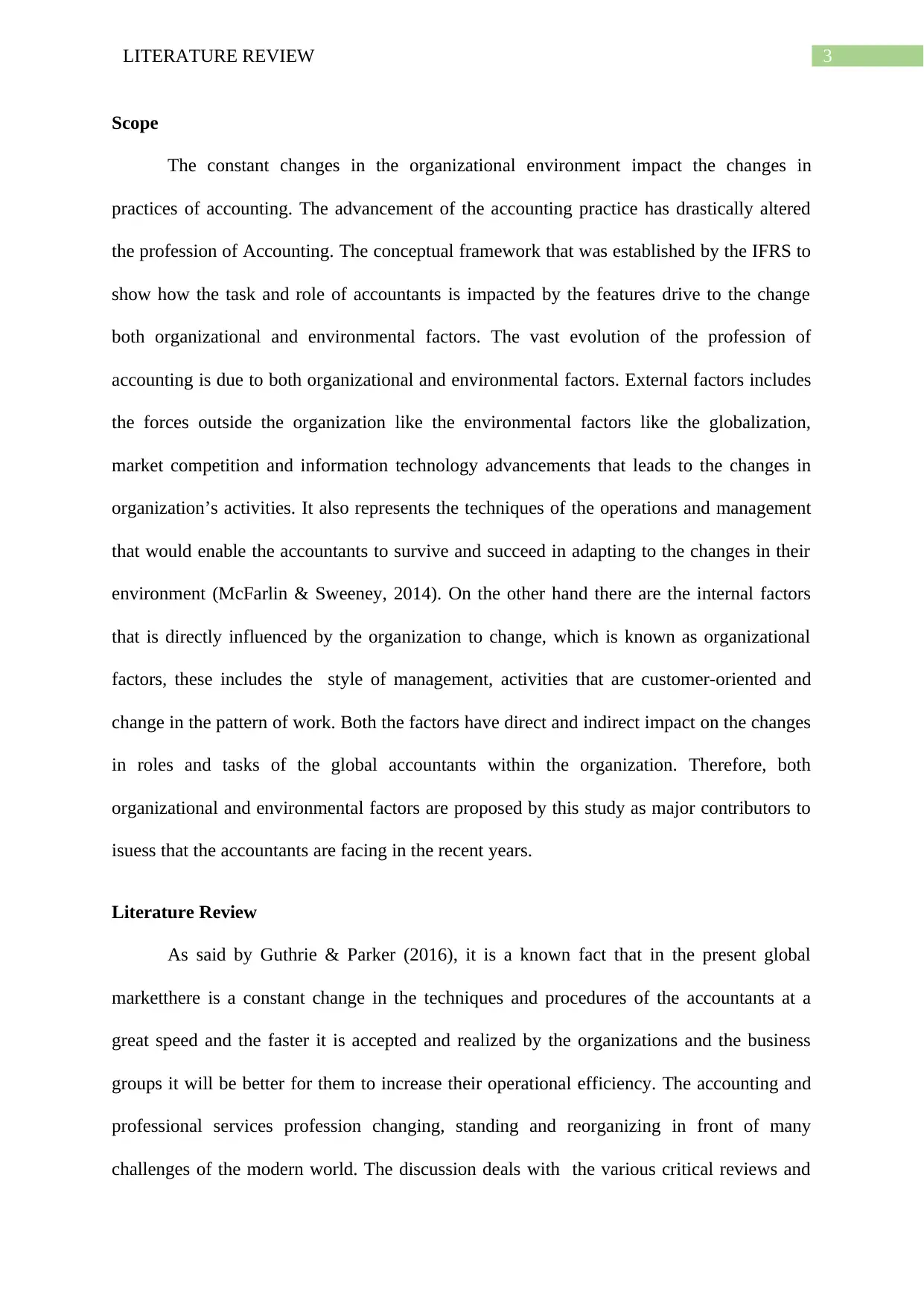
3LITERATURE REVIEW
Scope
The constant changes in the organizational environment impact the changes in
practices of accounting. The advancement of the accounting practice has drastically altered
the profession of Accounting. The conceptual framework that was established by the IFRS to
show how the task and role of accountants is impacted by the features drive to the change
both organizational and environmental factors. The vast evolution of the profession of
accounting is due to both organizational and environmental factors. External factors includes
the forces outside the organization like the environmental factors like the globalization,
market competition and information technology advancements that leads to the changes in
organization’s activities. It also represents the techniques of the operations and management
that would enable the accountants to survive and succeed in adapting to the changes in their
environment (McFarlin & Sweeney, 2014). On the other hand there are the internal factors
that is directly influenced by the organization to change, which is known as organizational
factors, these includes the style of management, activities that are customer-oriented and
change in the pattern of work. Both the factors have direct and indirect impact on the changes
in roles and tasks of the global accountants within the organization. Therefore, both
organizational and environmental factors are proposed by this study as major contributors to
isuess that the accountants are facing in the recent years.
Literature Review
As said by Guthrie & Parker (2016), it is a known fact that in the present global
marketthere is a constant change in the techniques and procedures of the accountants at a
great speed and the faster it is accepted and realized by the organizations and the business
groups it will be better for them to increase their operational efficiency. The accounting and
professional services profession changing, standing and reorganizing in front of many
challenges of the modern world. The discussion deals with the various critical reviews and
Scope
The constant changes in the organizational environment impact the changes in
practices of accounting. The advancement of the accounting practice has drastically altered
the profession of Accounting. The conceptual framework that was established by the IFRS to
show how the task and role of accountants is impacted by the features drive to the change
both organizational and environmental factors. The vast evolution of the profession of
accounting is due to both organizational and environmental factors. External factors includes
the forces outside the organization like the environmental factors like the globalization,
market competition and information technology advancements that leads to the changes in
organization’s activities. It also represents the techniques of the operations and management
that would enable the accountants to survive and succeed in adapting to the changes in their
environment (McFarlin & Sweeney, 2014). On the other hand there are the internal factors
that is directly influenced by the organization to change, which is known as organizational
factors, these includes the style of management, activities that are customer-oriented and
change in the pattern of work. Both the factors have direct and indirect impact on the changes
in roles and tasks of the global accountants within the organization. Therefore, both
organizational and environmental factors are proposed by this study as major contributors to
isuess that the accountants are facing in the recent years.
Literature Review
As said by Guthrie & Parker (2016), it is a known fact that in the present global
marketthere is a constant change in the techniques and procedures of the accountants at a
great speed and the faster it is accepted and realized by the organizations and the business
groups it will be better for them to increase their operational efficiency. The accounting and
professional services profession changing, standing and reorganizing in front of many
challenges of the modern world. The discussion deals with the various critical reviews and
Secure Best Marks with AI Grader
Need help grading? Try our AI Grader for instant feedback on your assignments.
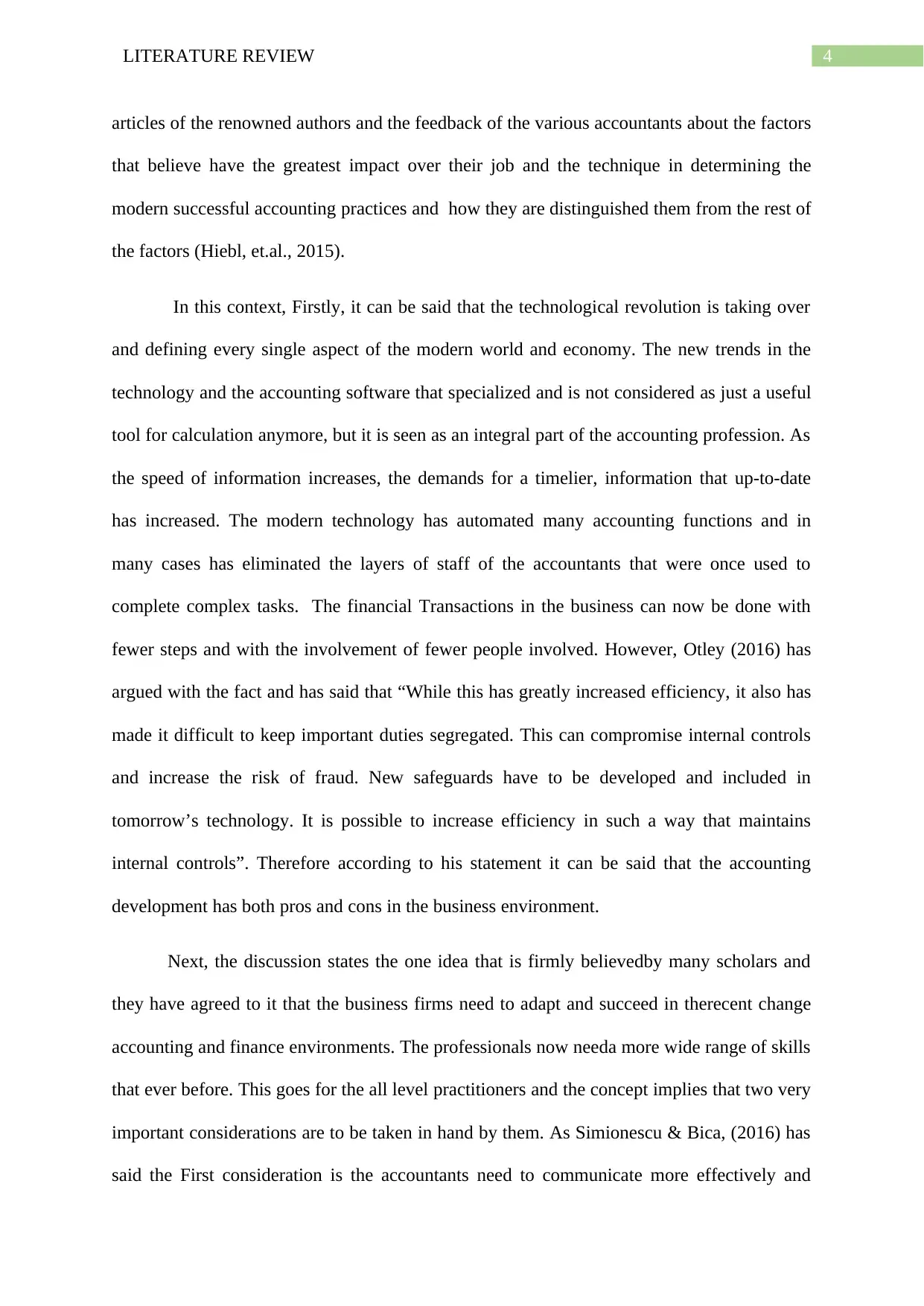
4LITERATURE REVIEW
articles of the renowned authors and the feedback of the various accountants about the factors
that believe have the greatest impact over their job and the technique in determining the
modern successful accounting practices and how they are distinguished them from the rest of
the factors (Hiebl, et.al., 2015).
In this context, Firstly, it can be said that the technological revolution is taking over
and defining every single aspect of the modern world and economy. The new trends in the
technology and the accounting software that specialized and is not considered as just a useful
tool for calculation anymore, but it is seen as an integral part of the accounting profession. As
the speed of information increases, the demands for a timelier, information that up-to-date
has increased. The modern technology has automated many accounting functions and in
many cases has eliminated the layers of staff of the accountants that were once used to
complete complex tasks. The financial Transactions in the business can now be done with
fewer steps and with the involvement of fewer people involved. However, Otley (2016) has
argued with the fact and has said that “While this has greatly increased efficiency, it also has
made it difficult to keep important duties segregated. This can compromise internal controls
and increase the risk of fraud. New safeguards have to be developed and included in
tomorrow’s technology. It is possible to increase efficiency in such a way that maintains
internal controls”. Therefore according to his statement it can be said that the accounting
development has both pros and cons in the business environment.
Next, the discussion states the one idea that is firmly believedby many scholars and
they have agreed to it that the business firms need to adapt and succeed in therecent change
accounting and finance environments. The professionals now needa more wide range of skills
that ever before. This goes for the all level practitioners and the concept implies that two very
important considerations are to be taken in hand by them. As Simionescu & Bica, (2016) has
said the First consideration is the accountants need to communicate more effectively and
articles of the renowned authors and the feedback of the various accountants about the factors
that believe have the greatest impact over their job and the technique in determining the
modern successful accounting practices and how they are distinguished them from the rest of
the factors (Hiebl, et.al., 2015).
In this context, Firstly, it can be said that the technological revolution is taking over
and defining every single aspect of the modern world and economy. The new trends in the
technology and the accounting software that specialized and is not considered as just a useful
tool for calculation anymore, but it is seen as an integral part of the accounting profession. As
the speed of information increases, the demands for a timelier, information that up-to-date
has increased. The modern technology has automated many accounting functions and in
many cases has eliminated the layers of staff of the accountants that were once used to
complete complex tasks. The financial Transactions in the business can now be done with
fewer steps and with the involvement of fewer people involved. However, Otley (2016) has
argued with the fact and has said that “While this has greatly increased efficiency, it also has
made it difficult to keep important duties segregated. This can compromise internal controls
and increase the risk of fraud. New safeguards have to be developed and included in
tomorrow’s technology. It is possible to increase efficiency in such a way that maintains
internal controls”. Therefore according to his statement it can be said that the accounting
development has both pros and cons in the business environment.
Next, the discussion states the one idea that is firmly believedby many scholars and
they have agreed to it that the business firms need to adapt and succeed in therecent change
accounting and finance environments. The professionals now needa more wide range of skills
that ever before. This goes for the all level practitioners and the concept implies that two very
important considerations are to be taken in hand by them. As Simionescu & Bica, (2016) has
said the First consideration is the accountants need to communicate more effectively and
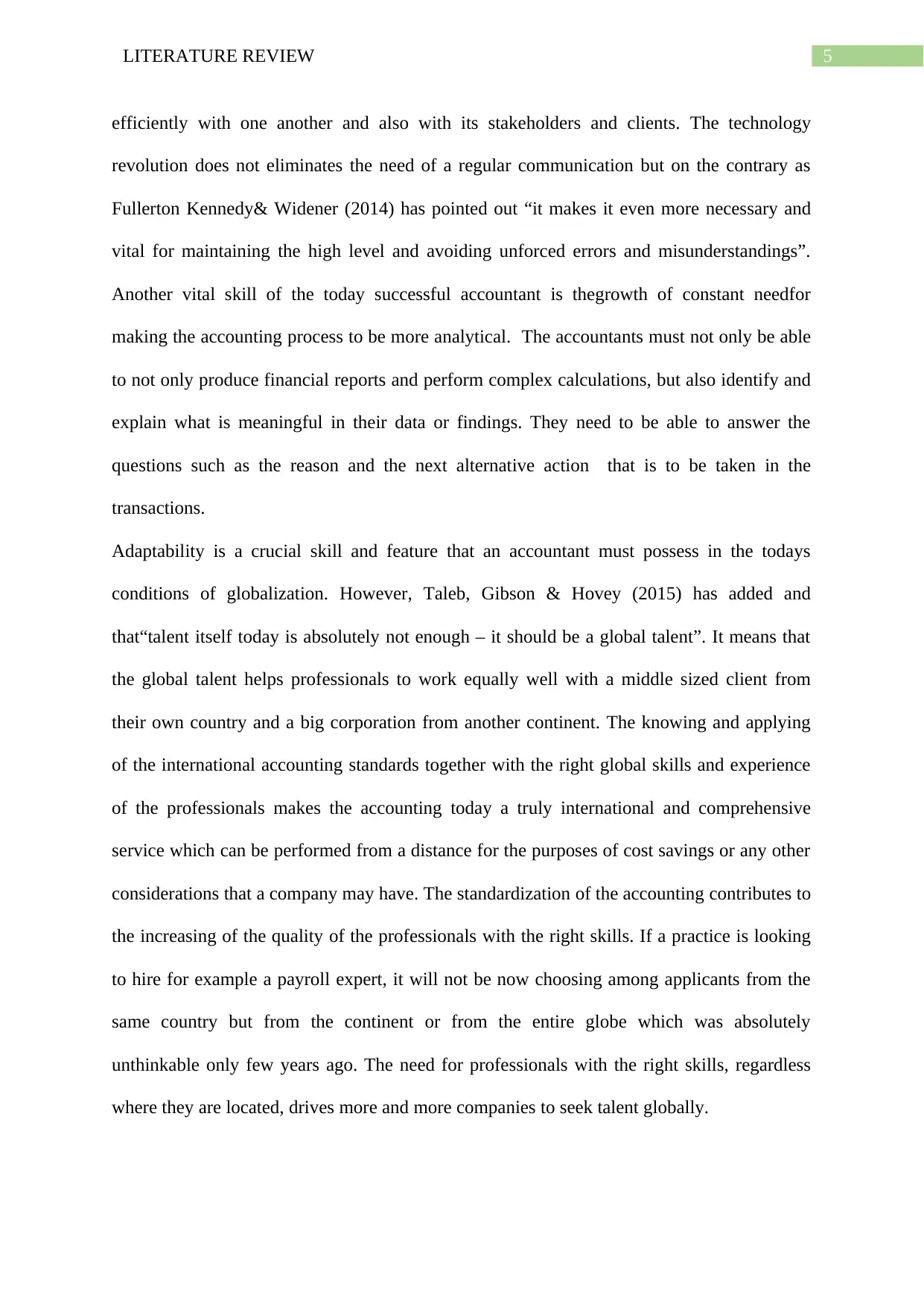
5LITERATURE REVIEW
efficiently with one another and also with its stakeholders and clients. The technology
revolution does not eliminates the need of a regular communication but on the contrary as
Fullerton Kennedy& Widener (2014) has pointed out “it makes it even more necessary and
vital for maintaining the high level and avoiding unforced errors and misunderstandings”.
Another vital skill of the today successful accountant is thegrowth of constant needfor
making the accounting process to be more analytical. The accountants must not only be able
to not only produce financial reports and perform complex calculations, but also identify and
explain what is meaningful in their data or findings. They need to be able to answer the
questions such as the reason and the next alternative action that is to be taken in the
transactions.
Adaptability is a crucial skill and feature that an accountant must possess in the todays
conditions of globalization. However, Taleb, Gibson & Hovey (2015) has added and
that“talent itself today is absolutely not enough – it should be a global talent”. It means that
the global talent helps professionals to work equally well with a middle sized client from
their own country and a big corporation from another continent. The knowing and applying
of the international accounting standards together with the right global skills and experience
of the professionals makes the accounting today a truly international and comprehensive
service which can be performed from a distance for the purposes of cost savings or any other
considerations that a company may have. The standardization of the accounting contributes to
the increasing of the quality of the professionals with the right skills. If a practice is looking
to hire for example a payroll expert, it will not be now choosing among applicants from the
same country but from the continent or from the entire globe which was absolutely
unthinkable only few years ago. The need for professionals with the right skills, regardless
where they are located, drives more and more companies to seek talent globally.
efficiently with one another and also with its stakeholders and clients. The technology
revolution does not eliminates the need of a regular communication but on the contrary as
Fullerton Kennedy& Widener (2014) has pointed out “it makes it even more necessary and
vital for maintaining the high level and avoiding unforced errors and misunderstandings”.
Another vital skill of the today successful accountant is thegrowth of constant needfor
making the accounting process to be more analytical. The accountants must not only be able
to not only produce financial reports and perform complex calculations, but also identify and
explain what is meaningful in their data or findings. They need to be able to answer the
questions such as the reason and the next alternative action that is to be taken in the
transactions.
Adaptability is a crucial skill and feature that an accountant must possess in the todays
conditions of globalization. However, Taleb, Gibson & Hovey (2015) has added and
that“talent itself today is absolutely not enough – it should be a global talent”. It means that
the global talent helps professionals to work equally well with a middle sized client from
their own country and a big corporation from another continent. The knowing and applying
of the international accounting standards together with the right global skills and experience
of the professionals makes the accounting today a truly international and comprehensive
service which can be performed from a distance for the purposes of cost savings or any other
considerations that a company may have. The standardization of the accounting contributes to
the increasing of the quality of the professionals with the right skills. If a practice is looking
to hire for example a payroll expert, it will not be now choosing among applicants from the
same country but from the continent or from the entire globe which was absolutely
unthinkable only few years ago. The need for professionals with the right skills, regardless
where they are located, drives more and more companies to seek talent globally.
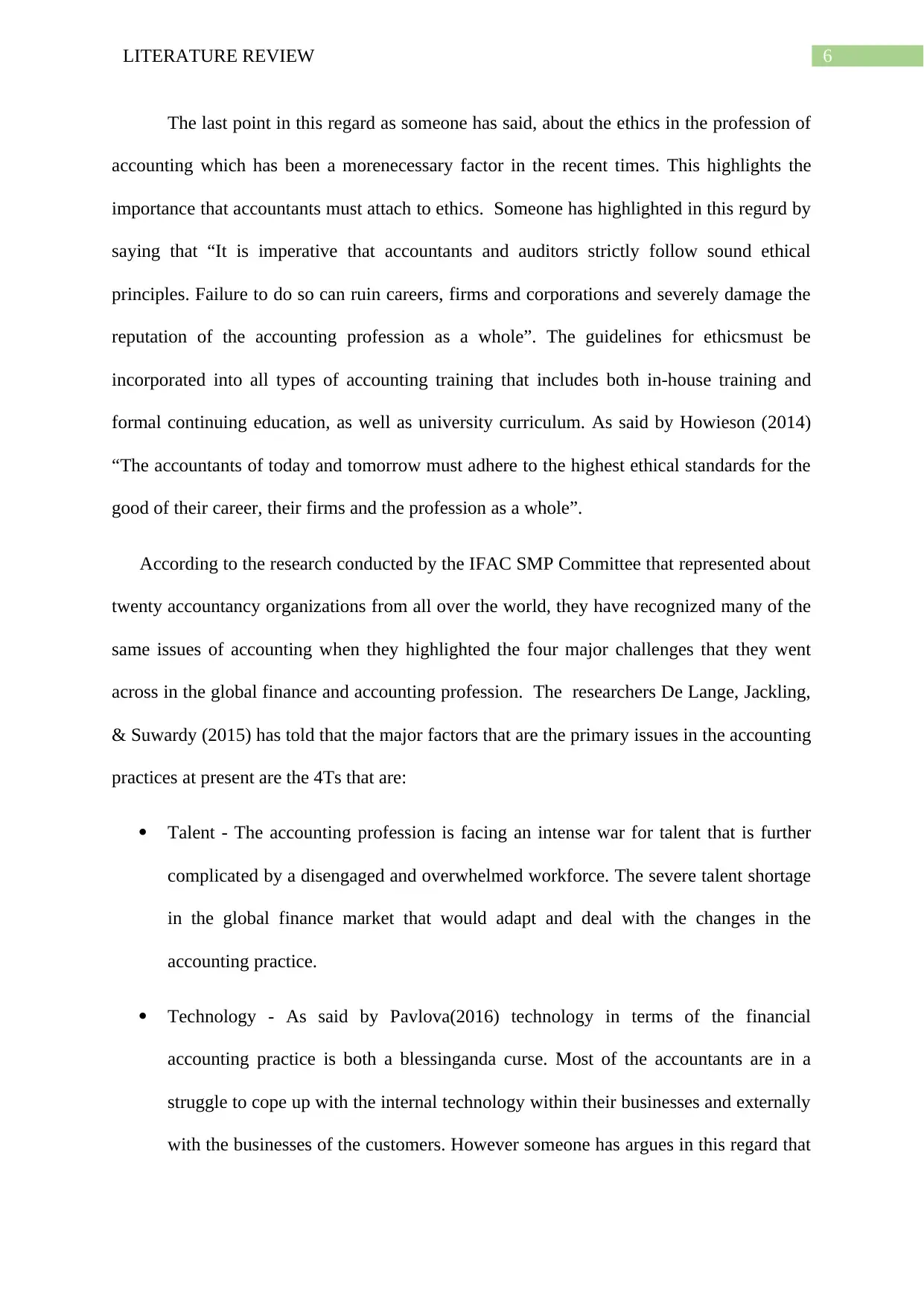
6LITERATURE REVIEW
The last point in this regard as someone has said, about the ethics in the profession of
accounting which has been a morenecessary factor in the recent times. This highlights the
importance that accountants must attach to ethics. Someone has highlighted in this regurd by
saying that “It is imperative that accountants and auditors strictly follow sound ethical
principles. Failure to do so can ruin careers, firms and corporations and severely damage the
reputation of the accounting profession as a whole”. The guidelines for ethicsmust be
incorporated into all types of accounting training that includes both in-house training and
formal continuing education, as well as university curriculum. As said by Howieson (2014)
“The accountants of today and tomorrow must adhere to the highest ethical standards for the
good of their career, their firms and the profession as a whole”.
According to the research conducted by the IFAC SMP Committee that represented about
twenty accountancy organizations from all over the world, they have recognized many of the
same issues of accounting when they highlighted the four major challenges that they went
across in the global finance and accounting profession. The researchers De Lange, Jackling,
& Suwardy (2015) has told that the major factors that are the primary issues in the accounting
practices at present are the 4Ts that are:
Talent - The accounting profession is facing an intense war for talent that is further
complicated by a disengaged and overwhelmed workforce. The severe talent shortage
in the global finance market that would adapt and deal with the changes in the
accounting practice.
Technology - As said by Pavlova(2016) technology in terms of the financial
accounting practice is both a blessinganda curse. Most of the accountants are in a
struggle to cope up with the internal technology within their businesses and externally
with the businesses of the customers. However someone has argues in this regard that
The last point in this regard as someone has said, about the ethics in the profession of
accounting which has been a morenecessary factor in the recent times. This highlights the
importance that accountants must attach to ethics. Someone has highlighted in this regurd by
saying that “It is imperative that accountants and auditors strictly follow sound ethical
principles. Failure to do so can ruin careers, firms and corporations and severely damage the
reputation of the accounting profession as a whole”. The guidelines for ethicsmust be
incorporated into all types of accounting training that includes both in-house training and
formal continuing education, as well as university curriculum. As said by Howieson (2014)
“The accountants of today and tomorrow must adhere to the highest ethical standards for the
good of their career, their firms and the profession as a whole”.
According to the research conducted by the IFAC SMP Committee that represented about
twenty accountancy organizations from all over the world, they have recognized many of the
same issues of accounting when they highlighted the four major challenges that they went
across in the global finance and accounting profession. The researchers De Lange, Jackling,
& Suwardy (2015) has told that the major factors that are the primary issues in the accounting
practices at present are the 4Ts that are:
Talent - The accounting profession is facing an intense war for talent that is further
complicated by a disengaged and overwhelmed workforce. The severe talent shortage
in the global finance market that would adapt and deal with the changes in the
accounting practice.
Technology - As said by Pavlova(2016) technology in terms of the financial
accounting practice is both a blessinganda curse. Most of the accountants are in a
struggle to cope up with the internal technology within their businesses and externally
with the businesses of the customers. However someone has argues in this regard that
Paraphrase This Document
Need a fresh take? Get an instant paraphrase of this document with our AI Paraphraser
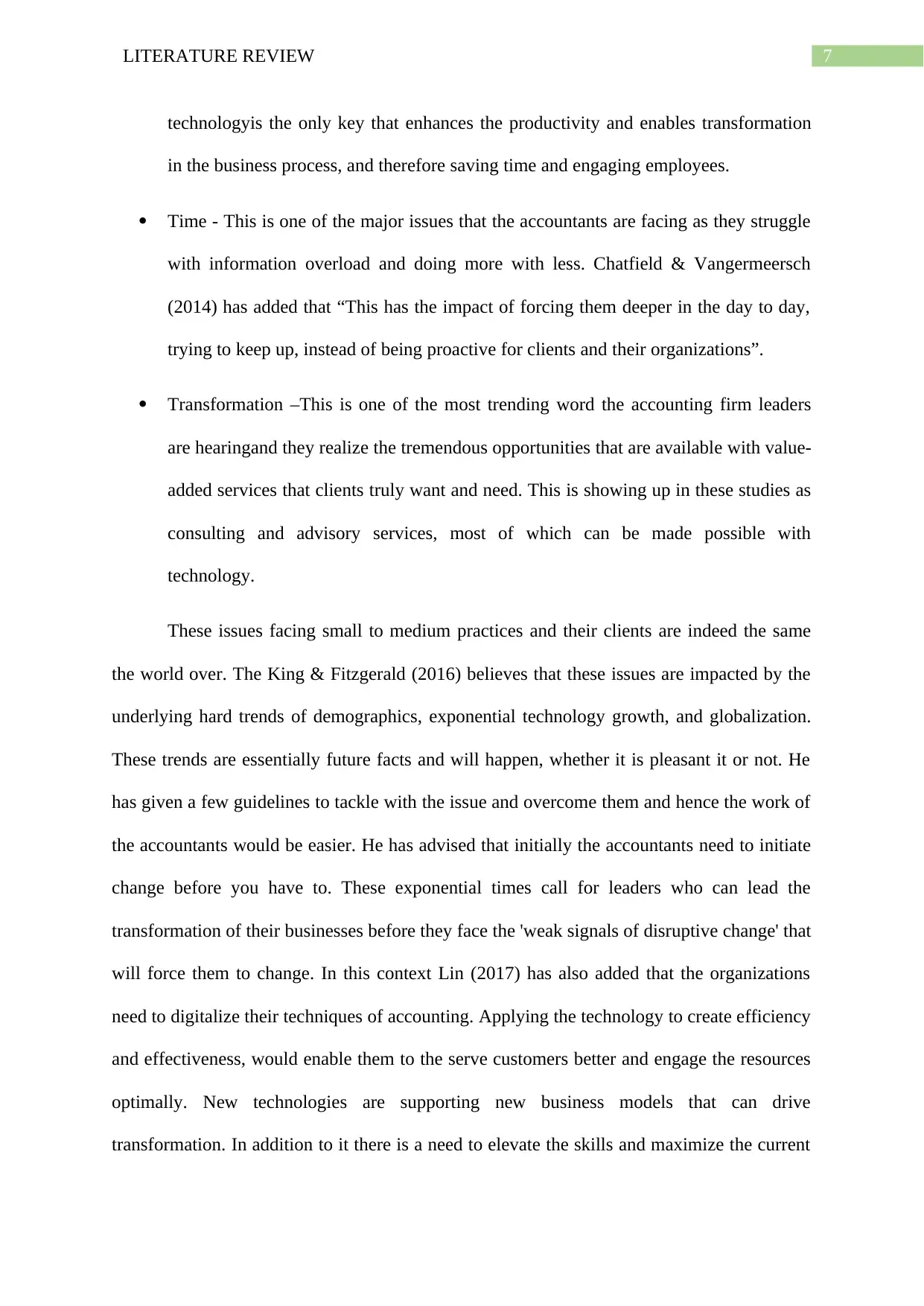
7LITERATURE REVIEW
technologyis the only key that enhances the productivity and enables transformation
in the business process, and therefore saving time and engaging employees.
Time - This is one of the major issues that the accountants are facing as they struggle
with information overload and doing more with less. Chatfield & Vangermeersch
(2014) has added that “This has the impact of forcing them deeper in the day to day,
trying to keep up, instead of being proactive for clients and their organizations”.
Transformation –This is one of the most trending word the accounting firm leaders
are hearingand they realize the tremendous opportunities that are available with value-
added services that clients truly want and need. This is showing up in these studies as
consulting and advisory services, most of which can be made possible with
technology.
These issues facing small to medium practices and their clients are indeed the same
the world over. The King & Fitzgerald (2016) believes that these issues are impacted by the
underlying hard trends of demographics, exponential technology growth, and globalization.
These trends are essentially future facts and will happen, whether it is pleasant it or not. He
has given a few guidelines to tackle with the issue and overcome them and hence the work of
the accountants would be easier. He has advised that initially the accountants need to initiate
change before you have to. These exponential times call for leaders who can lead the
transformation of their businesses before they face the 'weak signals of disruptive change' that
will force them to change. In this context Lin (2017) has also added that the organizations
need to digitalize their techniques of accounting. Applying the technology to create efficiency
and effectiveness, would enable them to the serve customers better and engage the resources
optimally. New technologies are supporting new business models that can drive
transformation. In addition to it there is a need to elevate the skills and maximize the current
technologyis the only key that enhances the productivity and enables transformation
in the business process, and therefore saving time and engaging employees.
Time - This is one of the major issues that the accountants are facing as they struggle
with information overload and doing more with less. Chatfield & Vangermeersch
(2014) has added that “This has the impact of forcing them deeper in the day to day,
trying to keep up, instead of being proactive for clients and their organizations”.
Transformation –This is one of the most trending word the accounting firm leaders
are hearingand they realize the tremendous opportunities that are available with value-
added services that clients truly want and need. This is showing up in these studies as
consulting and advisory services, most of which can be made possible with
technology.
These issues facing small to medium practices and their clients are indeed the same
the world over. The King & Fitzgerald (2016) believes that these issues are impacted by the
underlying hard trends of demographics, exponential technology growth, and globalization.
These trends are essentially future facts and will happen, whether it is pleasant it or not. He
has given a few guidelines to tackle with the issue and overcome them and hence the work of
the accountants would be easier. He has advised that initially the accountants need to initiate
change before you have to. These exponential times call for leaders who can lead the
transformation of their businesses before they face the 'weak signals of disruptive change' that
will force them to change. In this context Lin (2017) has also added that the organizations
need to digitalize their techniques of accounting. Applying the technology to create efficiency
and effectiveness, would enable them to the serve customers better and engage the resources
optimally. New technologies are supporting new business models that can drive
transformation. In addition to it there is a need to elevate the skills and maximize the current
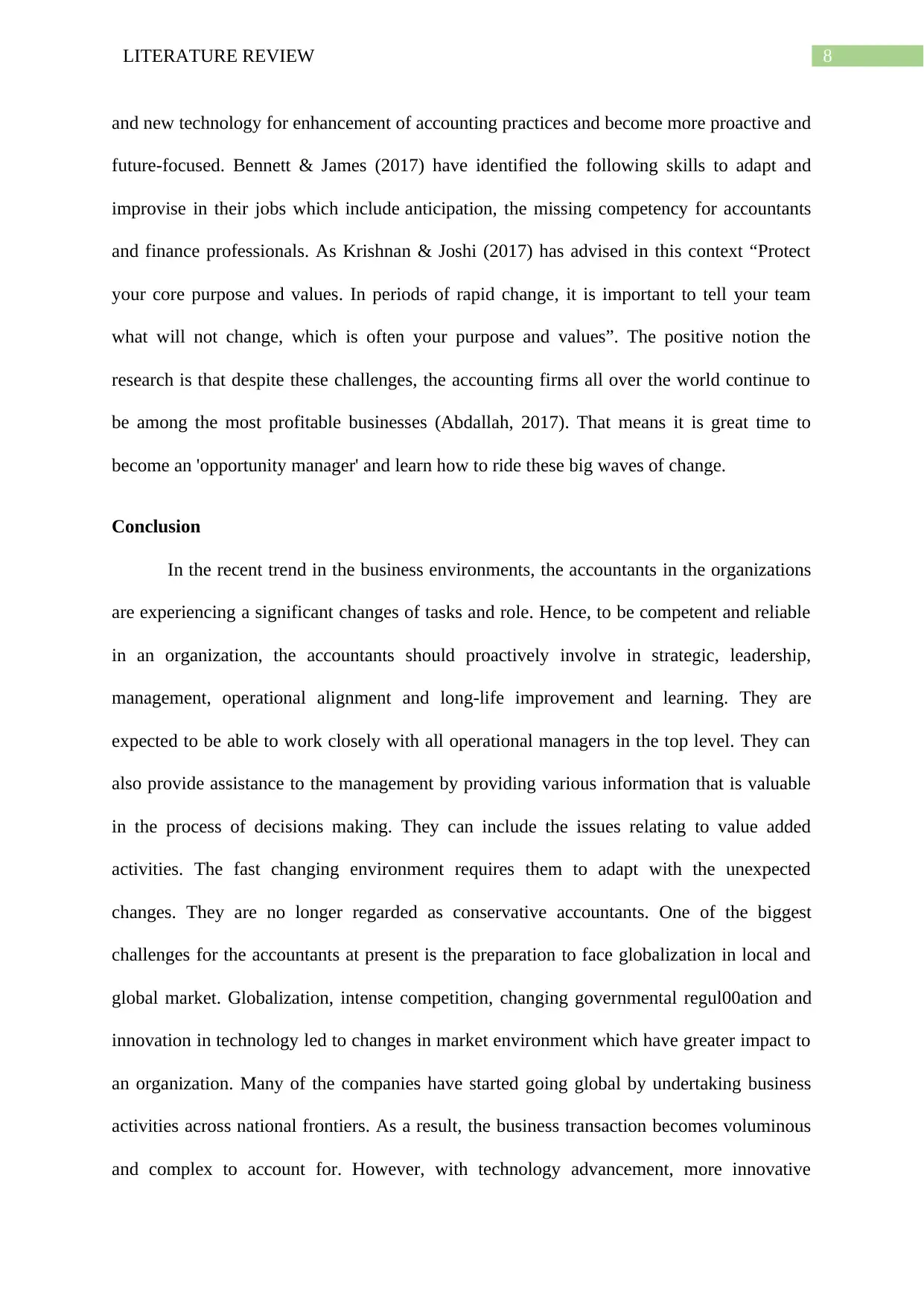
8LITERATURE REVIEW
and new technology for enhancement of accounting practices and become more proactive and
future-focused. Bennett & James (2017) have identified the following skills to adapt and
improvise in their jobs which include anticipation, the missing competency for accountants
and finance professionals. As Krishnan & Joshi (2017) has advised in this context “Protect
your core purpose and values. In periods of rapid change, it is important to tell your team
what will not change, which is often your purpose and values”. The positive notion the
research is that despite these challenges, the accounting firms all over the world continue to
be among the most profitable businesses (Abdallah, 2017). That means it is great time to
become an 'opportunity manager' and learn how to ride these big waves of change.
Conclusion
In the recent trend in the business environments, the accountants in the organizations
are experiencing a significant changes of tasks and role. Hence, to be competent and reliable
in an organization, the accountants should proactively involve in strategic, leadership,
management, operational alignment and long-life improvement and learning. They are
expected to be able to work closely with all operational managers in the top level. They can
also provide assistance to the management by providing various information that is valuable
in the process of decisions making. They can include the issues relating to value added
activities. The fast changing environment requires them to adapt with the unexpected
changes. They are no longer regarded as conservative accountants. One of the biggest
challenges for the accountants at present is the preparation to face globalization in local and
global market. Globalization, intense competition, changing governmental regul00ation and
innovation in technology led to changes in market environment which have greater impact to
an organization. Many of the companies have started going global by undertaking business
activities across national frontiers. As a result, the business transaction becomes voluminous
and complex to account for. However, with technology advancement, more innovative
and new technology for enhancement of accounting practices and become more proactive and
future-focused. Bennett & James (2017) have identified the following skills to adapt and
improvise in their jobs which include anticipation, the missing competency for accountants
and finance professionals. As Krishnan & Joshi (2017) has advised in this context “Protect
your core purpose and values. In periods of rapid change, it is important to tell your team
what will not change, which is often your purpose and values”. The positive notion the
research is that despite these challenges, the accounting firms all over the world continue to
be among the most profitable businesses (Abdallah, 2017). That means it is great time to
become an 'opportunity manager' and learn how to ride these big waves of change.
Conclusion
In the recent trend in the business environments, the accountants in the organizations
are experiencing a significant changes of tasks and role. Hence, to be competent and reliable
in an organization, the accountants should proactively involve in strategic, leadership,
management, operational alignment and long-life improvement and learning. They are
expected to be able to work closely with all operational managers in the top level. They can
also provide assistance to the management by providing various information that is valuable
in the process of decisions making. They can include the issues relating to value added
activities. The fast changing environment requires them to adapt with the unexpected
changes. They are no longer regarded as conservative accountants. One of the biggest
challenges for the accountants at present is the preparation to face globalization in local and
global market. Globalization, intense competition, changing governmental regul00ation and
innovation in technology led to changes in market environment which have greater impact to
an organization. Many of the companies have started going global by undertaking business
activities across national frontiers. As a result, the business transaction becomes voluminous
and complex to account for. However, with technology advancement, more innovative
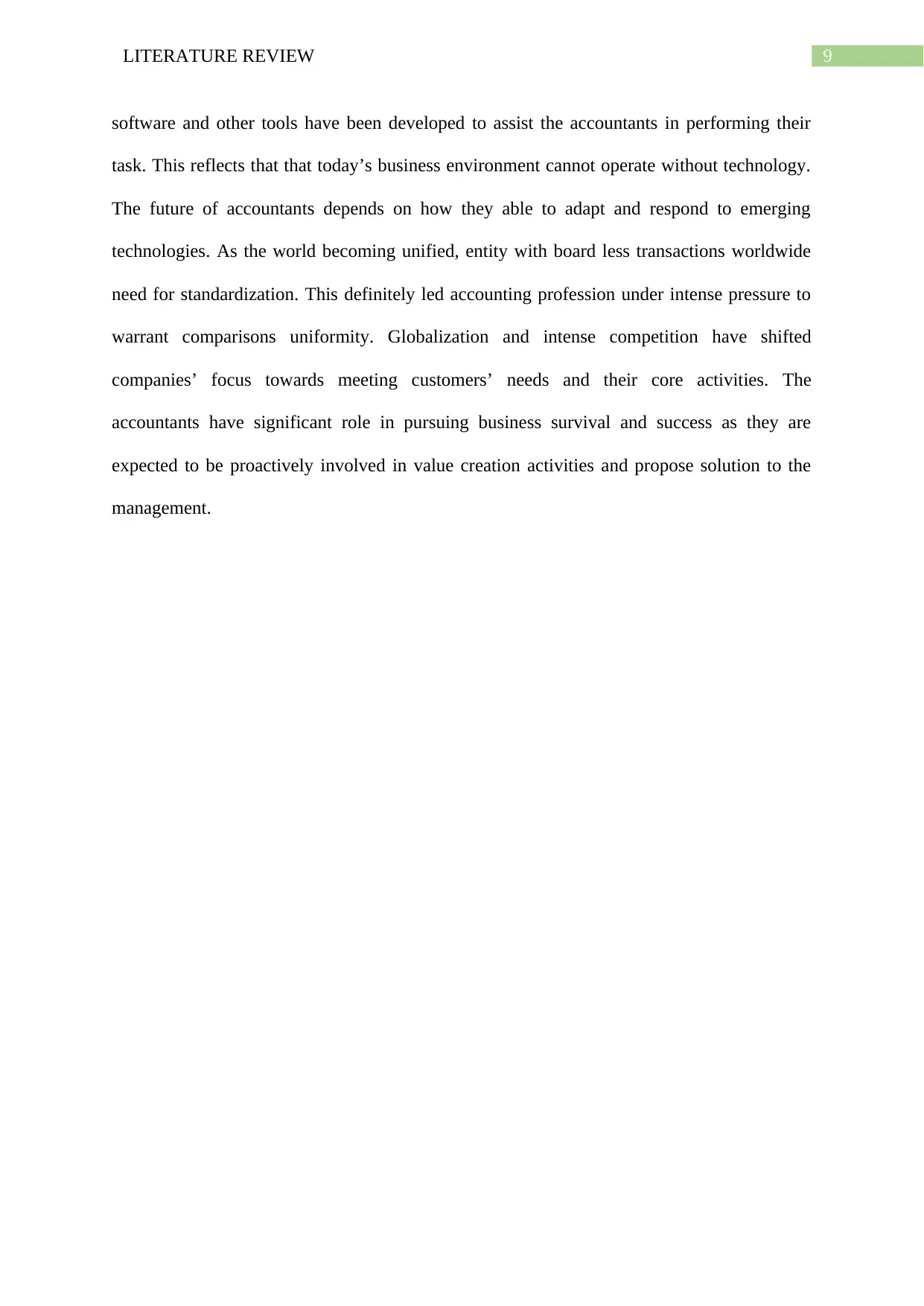
9LITERATURE REVIEW
software and other tools have been developed to assist the accountants in performing their
task. This reflects that that today’s business environment cannot operate without technology.
The future of accountants depends on how they able to adapt and respond to emerging
technologies. As the world becoming unified, entity with board less transactions worldwide
need for standardization. This definitely led accounting profession under intense pressure to
warrant comparisons uniformity. Globalization and intense competition have shifted
companies’ focus towards meeting customers’ needs and their core activities. The
accountants have significant role in pursuing business survival and success as they are
expected to be proactively involved in value creation activities and propose solution to the
management.
software and other tools have been developed to assist the accountants in performing their
task. This reflects that that today’s business environment cannot operate without technology.
The future of accountants depends on how they able to adapt and respond to emerging
technologies. As the world becoming unified, entity with board less transactions worldwide
need for standardization. This definitely led accounting profession under intense pressure to
warrant comparisons uniformity. Globalization and intense competition have shifted
companies’ focus towards meeting customers’ needs and their core activities. The
accountants have significant role in pursuing business survival and success as they are
expected to be proactively involved in value creation activities and propose solution to the
management.
Secure Best Marks with AI Grader
Need help grading? Try our AI Grader for instant feedback on your assignments.
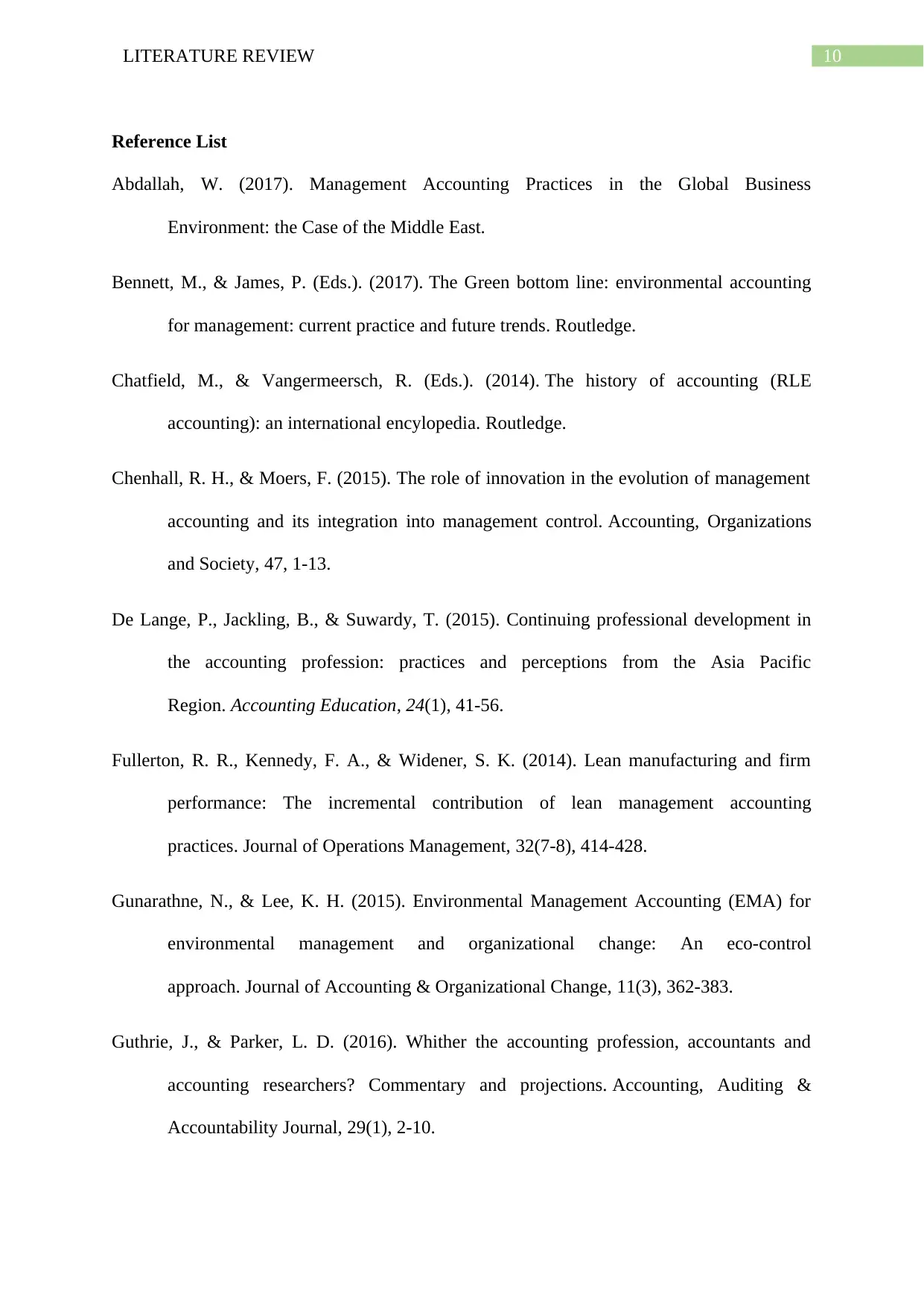
10LITERATURE REVIEW
Reference List
Abdallah, W. (2017). Management Accounting Practices in the Global Business
Environment: the Case of the Middle East.
Bennett, M., & James, P. (Eds.). (2017). The Green bottom line: environmental accounting
for management: current practice and future trends. Routledge.
Chatfield, M., & Vangermeersch, R. (Eds.). (2014). The history of accounting (RLE
accounting): an international encylopedia. Routledge.
Chenhall, R. H., & Moers, F. (2015). The role of innovation in the evolution of management
accounting and its integration into management control. Accounting, Organizations
and Society, 47, 1-13.
De Lange, P., Jackling, B., & Suwardy, T. (2015). Continuing professional development in
the accounting profession: practices and perceptions from the Asia Pacific
Region. Accounting Education, 24(1), 41-56.
Fullerton, R. R., Kennedy, F. A., & Widener, S. K. (2014). Lean manufacturing and firm
performance: The incremental contribution of lean management accounting
practices. Journal of Operations Management, 32(7-8), 414-428.
Gunarathne, N., & Lee, K. H. (2015). Environmental Management Accounting (EMA) for
environmental management and organizational change: An eco-control
approach. Journal of Accounting & Organizational Change, 11(3), 362-383.
Guthrie, J., & Parker, L. D. (2016). Whither the accounting profession, accountants and
accounting researchers? Commentary and projections. Accounting, Auditing &
Accountability Journal, 29(1), 2-10.
Reference List
Abdallah, W. (2017). Management Accounting Practices in the Global Business
Environment: the Case of the Middle East.
Bennett, M., & James, P. (Eds.). (2017). The Green bottom line: environmental accounting
for management: current practice and future trends. Routledge.
Chatfield, M., & Vangermeersch, R. (Eds.). (2014). The history of accounting (RLE
accounting): an international encylopedia. Routledge.
Chenhall, R. H., & Moers, F. (2015). The role of innovation in the evolution of management
accounting and its integration into management control. Accounting, Organizations
and Society, 47, 1-13.
De Lange, P., Jackling, B., & Suwardy, T. (2015). Continuing professional development in
the accounting profession: practices and perceptions from the Asia Pacific
Region. Accounting Education, 24(1), 41-56.
Fullerton, R. R., Kennedy, F. A., & Widener, S. K. (2014). Lean manufacturing and firm
performance: The incremental contribution of lean management accounting
practices. Journal of Operations Management, 32(7-8), 414-428.
Gunarathne, N., & Lee, K. H. (2015). Environmental Management Accounting (EMA) for
environmental management and organizational change: An eco-control
approach. Journal of Accounting & Organizational Change, 11(3), 362-383.
Guthrie, J., & Parker, L. D. (2016). Whither the accounting profession, accountants and
accounting researchers? Commentary and projections. Accounting, Auditing &
Accountability Journal, 29(1), 2-10.
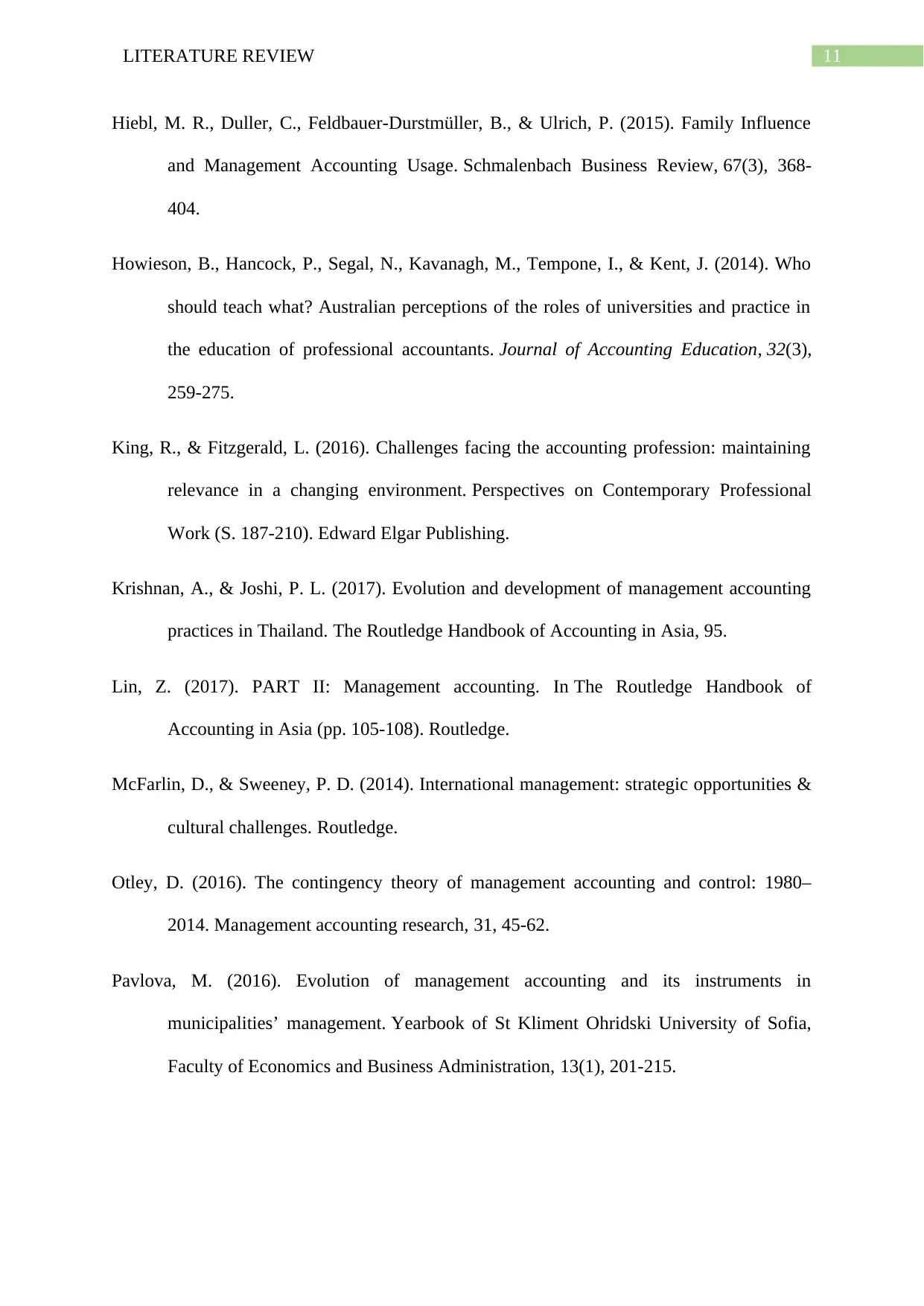
11LITERATURE REVIEW
Hiebl, M. R., Duller, C., Feldbauer-Durstmüller, B., & Ulrich, P. (2015). Family Influence
and Management Accounting Usage. Schmalenbach Business Review, 67(3), 368-
404.
Howieson, B., Hancock, P., Segal, N., Kavanagh, M., Tempone, I., & Kent, J. (2014). Who
should teach what? Australian perceptions of the roles of universities and practice in
the education of professional accountants. Journal of Accounting Education, 32(3),
259-275.
King, R., & Fitzgerald, L. (2016). Challenges facing the accounting profession: maintaining
relevance in a changing environment. Perspectives on Contemporary Professional
Work (S. 187-210). Edward Elgar Publishing.
Krishnan, A., & Joshi, P. L. (2017). Evolution and development of management accounting
practices in Thailand. The Routledge Handbook of Accounting in Asia, 95.
Lin, Z. (2017). PART II: Management accounting. In The Routledge Handbook of
Accounting in Asia (pp. 105-108). Routledge.
McFarlin, D., & Sweeney, P. D. (2014). International management: strategic opportunities &
cultural challenges. Routledge.
Otley, D. (2016). The contingency theory of management accounting and control: 1980–
2014. Management accounting research, 31, 45-62.
Pavlova, M. (2016). Evolution of management accounting and its instruments in
municipalities’ management. Yearbook of St Kliment Ohridski University of Sofia,
Faculty of Economics and Business Administration, 13(1), 201-215.
Hiebl, M. R., Duller, C., Feldbauer-Durstmüller, B., & Ulrich, P. (2015). Family Influence
and Management Accounting Usage. Schmalenbach Business Review, 67(3), 368-
404.
Howieson, B., Hancock, P., Segal, N., Kavanagh, M., Tempone, I., & Kent, J. (2014). Who
should teach what? Australian perceptions of the roles of universities and practice in
the education of professional accountants. Journal of Accounting Education, 32(3),
259-275.
King, R., & Fitzgerald, L. (2016). Challenges facing the accounting profession: maintaining
relevance in a changing environment. Perspectives on Contemporary Professional
Work (S. 187-210). Edward Elgar Publishing.
Krishnan, A., & Joshi, P. L. (2017). Evolution and development of management accounting
practices in Thailand. The Routledge Handbook of Accounting in Asia, 95.
Lin, Z. (2017). PART II: Management accounting. In The Routledge Handbook of
Accounting in Asia (pp. 105-108). Routledge.
McFarlin, D., & Sweeney, P. D. (2014). International management: strategic opportunities &
cultural challenges. Routledge.
Otley, D. (2016). The contingency theory of management accounting and control: 1980–
2014. Management accounting research, 31, 45-62.
Pavlova, M. (2016). Evolution of management accounting and its instruments in
municipalities’ management. Yearbook of St Kliment Ohridski University of Sofia,
Faculty of Economics and Business Administration, 13(1), 201-215.
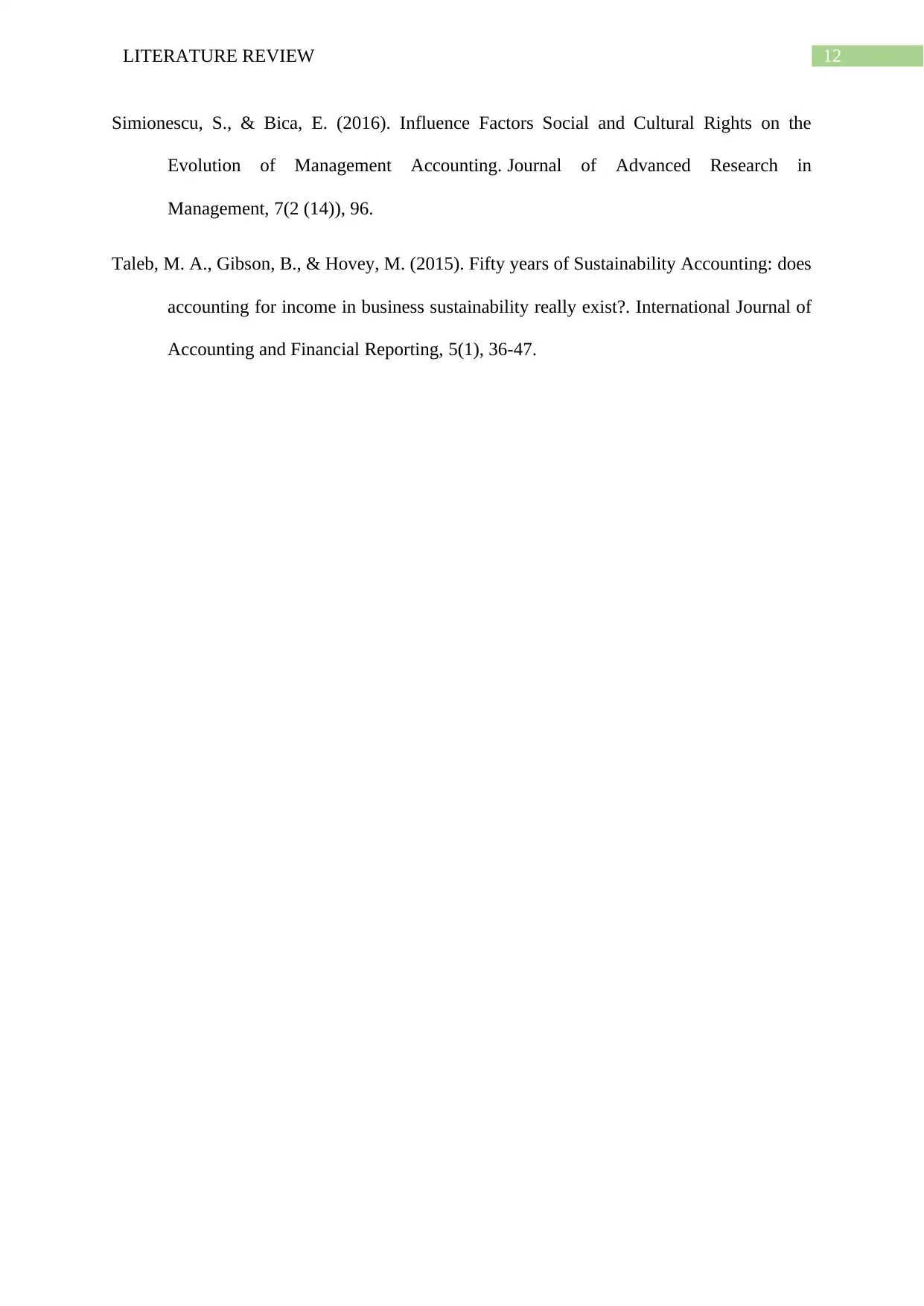
12LITERATURE REVIEW
Simionescu, S., & Bica, E. (2016). Influence Factors Social and Cultural Rights on the
Evolution of Management Accounting. Journal of Advanced Research in
Management, 7(2 (14)), 96.
Taleb, M. A., Gibson, B., & Hovey, M. (2015). Fifty years of Sustainability Accounting: does
accounting for income in business sustainability really exist?. International Journal of
Accounting and Financial Reporting, 5(1), 36-47.
Simionescu, S., & Bica, E. (2016). Influence Factors Social and Cultural Rights on the
Evolution of Management Accounting. Journal of Advanced Research in
Management, 7(2 (14)), 96.
Taleb, M. A., Gibson, B., & Hovey, M. (2015). Fifty years of Sustainability Accounting: does
accounting for income in business sustainability really exist?. International Journal of
Accounting and Financial Reporting, 5(1), 36-47.
1 out of 13
Related Documents
Your All-in-One AI-Powered Toolkit for Academic Success.
+13062052269
info@desklib.com
Available 24*7 on WhatsApp / Email
![[object Object]](/_next/static/media/star-bottom.7253800d.svg)
Unlock your academic potential
© 2024 | Zucol Services PVT LTD | All rights reserved.




